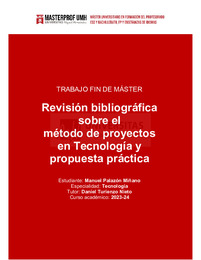Resumen :
En nuestra cotidianidad convivimos con el desarrollo tecnológico, lo cual
hace necesario el aprendizaje sobre el mismo, desde edades tempranas,
adecuadas al desarrollo cognitivo.
Se ha elaborado esta revisión bibliográfica sobre autores que han
realizado estudios que nos ayudan a comprender la eficacia del método de
proyectos para la enseñanza de Tecnología en la ESO.
Dichos estudios nos dan indicios de que el método de proyectos, es una
de las metodologías más eficaces (comparado con otras), para que el alumnado
consiga alcanzar los saberes básicos, competencias específicas, los ODS,
además de mejorar en cuanto a logros, satisfacción y desarrollo de habilidades
blandas tales como el trabajo en equipo, la comunicación, pensamiento crítico; y
al mismo tiempo incrementa la motivación intrínseca, y con ello el rendimiento
académico.
Finalmente, se reflexionará sobre como el método de proyectos puede ser
integrador interdisciplinar y transversal, inclusive en su aspecto físico, facilitando
así el aprendizaje colaborativo.
Se plantea una propuesta, y concluye con una recomendación, sobre las
perspectivas de dicha metodología y sobre la capacitación docente, y así poder
conseguir el desarrollo integral del alumno, y por tanto, de la persona.
In our daily life, we coexist with technological development, which makes
it necessary to learn about it from an early age, appropriate to cognitive
development.
A bibliographic review has been conducted on authors who have carried
out studies that help us to understand the effectiveness of the project method for
the teaching of Technology in ESO.
These studies give us indications that the project method is one of the
most effective methodologies (compared to others) for students to achieve basic
knowledge, specific competencies, SDGs (Sustainable Development Goals), as
well as improving achievement, satisfaction and development of soft skills such
as teamwork, communication, critical thinking; and at the same time increases
intrinsic motivation, and thus academic performance.
Finally, it will reflect on how the project method can be interdisciplinary and
transversal integrator, including in its physical aspect, thus facilitating
collaborative learning.
A proposal is made, and concludes with a recommendation, on the
perspectives of this methodology and on teacher training, in order to achieve the
integral development of the student, and therefore, of the person.
|
 La licencia se describe como: Atribución-NonComercial-NoDerivada 4.0 Internacional.
La licencia se describe como: Atribución-NonComercial-NoDerivada 4.0 Internacional.
.png)
